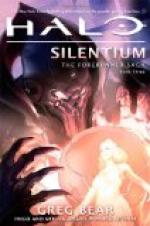The little Norman sat up. “I am not crying,” he declared, turning a brown, pugnacious face towards his late foe, “see, there are no tears.”
The man touched his cheeks and eyelids delicately with his dirty fingers. “True—no tears. But—why, why did you——”
“I was screaming because that noise was so horrible.”
“And—that noise gave you pain?”
Bullet-Head frowned. Like all Normans, he resented his mental privacy being intruded on by questions.
“Not pain; it gives me a horrible, hollow feeling in my inside,” he admitted grudgingly, “just under the belt.”
After a moment he added, his dark eyes fixed angrily on the violin, “I hate violins; they are dreadful things. M. Chalumeau had one. I broke it.”
The blind man laughed gratingly. “Because it made such a horrible noise?”
“Yes.”
Another pause, and then the man’s expression of vacant malice turned to one pitiful to see, one of indistinct yearning. “Give it to me,” he muttered, “they say I am half mad, and perhaps I am, but—I think I could play once——” The yellow dog snapped at a fly, and his master turned towards him, adding, “Before your time, Papillon, long before.”
The bow touched the strings once or twice gently and ineffectively, and then, his lips twitching, his eyelids as much closed as the scars on their lids allowed them to be, he began to play.
It was the playing of one who had forgotten nearly everything of his art, but it was sweet and true and strangely touching. To the boy it was a miracle. He listened with the muscles of his face drawn tight in an effort at self-control unusual in such a child, his square, brown hands digging convulsively into the dry earth under the grass beside him. And as the shadows of the trees crept over the road, and the oppressive heat began to relent a little, the plaintive music went on and on, and scant, painful tears stood on the player’s face.
At last he stopped, and frowning in a puzzled way, said hoarsely, “What is the matter, Papillon, where have we got to?”
The dog’s tail stirred in answer, and at the same moment the other listener burst into loud, emotional sobs, and the old man remembered. “That’s it, that’s it. It’s the boy who made me remember—’Te rappelles tu, te rappelles—tu, ma Toinon?’ Why do you cry, little boy? Why do you cry?”
The boy dried his eyes on his smock sleeve.
“It—I am ten, too big to cry,” he returned, with the evasion born in him of his race, adding with the frankness peculiar to his own personality, “but I did cry. It was beautiful.”
The old man rose, and took up the dog’s lead.
“Beautiful. Yes. There was a time——” He paused for a second. “What is your name, little one?”
“Victor-Marie Joyselle.”
“Eh b’en, Victor-Marie Joyselle, listen to me. When you have learned to play the violin——” but Bullet-Head interrupted him.




